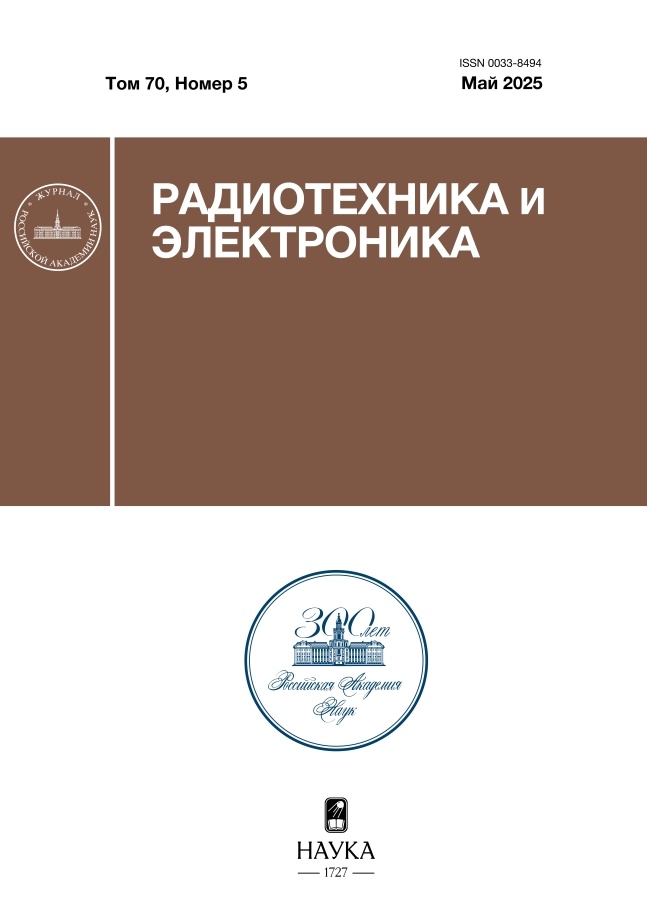A Flat Thin Structure with a Photonic (Electromagnetic) Band Gap Based on Band-Pass Periodic Gratings
- Authors: Kazantsev Y.N.1,2, Kraftmakher G.A.1, Mal’tsev V.P.1, Solosin V.S.1,2, Dyakonova O.A.1
-
Affiliations:
- Fryazino Branch Kotelnikov Institute of Radio Engineering and Electronics RAS
- Institute of Theoretical and Applied Electrodynamics RAS
- Issue: Vol 70, No 5 (2025)
- Pages: 480-488
- Section: ELECTRODYNAMICS AND RADIO WAVE PROPAGATION
- URL: https://rjeid.com/0033-8494/article/view/691162
- DOI: https://doi.org/10.31857/S0033849425050069
- EDN: https://elibrary.ru/qjwllm
- ID: 691162
Cite item
Abstract
It is shown that along with the UC-PBG lattice (Uniplanar Compact Photonic Band Gap) to create flat thin PBG structures (Photonic Band Gap) other types of bandwidth grids can be used. To study the locking bands in flat PBG structures of finite dimensions, a waveguide model is proposed in the form of a wide thin rectangular waveguide in which part of one of the wide walls is replaced by a band-pass grating. By numerical calculations of the frequency dependences of the reflection and transmission coefficients, the locking bands were determined in three PBG models, including the UC-PBG structure model. At the same time, it was shown that deep minima (–40 dB and deeper) in the microwave range are achievable at structure thicknesses of 1–2 mm or less. The possibility of providing effective isolation between transmitting and receiving microstrip antennas using a PBG structure based on an array of square slits is shown.
About the authors
Y. N. Kazantsev
Fryazino Branch Kotelnikov Institute of Radio Engineering and Electronics RAS; Institute of Theoretical and Applied Electrodynamics RAS
Email: gaarkr139@mail.ru
Vvedenskogo Squar., 1, Fryazino, Moscow region, 141190 Russian Federation; Izhorskaya Str., 13, Moscow, 125412 Russian Federation
G. A. Kraftmakher
Fryazino Branch Kotelnikov Institute of Radio Engineering and Electronics RAS
Email: gaarkr139@mail.ru
Vvedenskogo Squar., 1, Fryazino, Moscow region, 141190 Russian Federation
V. P. Mal’tsev
Fryazino Branch Kotelnikov Institute of Radio Engineering and Electronics RAS
Email: gaarkr139@mail.ru
Vvedenskogo Squar., 1, Fryazino, Moscow region, 141190 Russian Federation
V. S. Solosin
Fryazino Branch Kotelnikov Institute of Radio Engineering and Electronics RAS; Institute of Theoretical and Applied Electrodynamics RAS
Email: gaarkr139@mail.ru
Vvedenskogo Squar., 1, Fryazino, Moscow region, 141190 Russian Federation; Izhorskaya Str., 13, Moscow, 125412 Russian Federation
O. A. Dyakonova
Fryazino Branch Kotelnikov Institute of Radio Engineering and Electronics RAS
Author for correspondence.
Email: gaarkr139@mail.ru
Vvedenskogo Squar., 1, Fryazino, Moscow region, 141190 Russian Federation
References
- Yablonovitch E. // J. Opt. Soc. Amer. B. 1993. V. 10. № 2. P. 283.
- Qian Y., Radisic V.R., Itoh T. // Proc. 1997 Int. Asia-Pacific Microwave Conf. (APMC). Hong-Kong. 02–05 Dec. N.Y.: IEEE, 1997. V. 2. P. 585.
- Qian Y., Yang F-R., Itoh T. // Proc. 1998 Int. Asia-Pacific Microwave Conf. (APMC). Yokohama. 08–11 Dec. Tokyo: IEICE, 1998. P. 589.
- Yang F-R., Qian Y., Coccioli R., Itoh T. // IEEE Trans. 1998. V. MGW- 8. P. 372.
- Yang F-R., Qian Y., Itoh T. // Proc. 1998 Int. Asia-Pacific Microwave Conf. (APMC). Yokohama. 08–11 Dec. Tokyo: IEICE, 1998. P. 593.
- Yang F-R., Coccioli R., Qian Y., Itoh T. // Dig. 1999 IEEE Antennas and Propagation Soc. Int. Symp. Orlando. 11–16 Jul. N.Y.: IEEE, 1999. V. 3. P. 1920.
- Coccioli R., Yang F-R., Ma R.P., Itoh T. // IEEE Trans. 1999. V. MTT-47. № 11. P. 2123.
- Yang F-R., Qian Y., Itoh T. // Dig. 1999 IEEE Microwave Theory and Techniques Soc. (MTT-S) Int. Microwave Symp. Anaheim. 13–19 Jun. N.Y.: IEEE, 1999. V. 3. P. 919.
- Yang F-R., Ma R.P., Qian Y., Itoh T. // IEEE Trans. 1999. V. MTT-47. № 8. P. 1509.
- Yang F-R., Coccioli R., Qian Y., Itoh T. // Dig. 2000 IEEE Microwave Theory and Techniques Soc. (MTT-S) Int. Microwave Symp. Boston. 11–16 Jun. N.Y.: IEEE, 2000. V. 3. P. 1529.
- Дьяконова О.А., Казанцев Ю.Н. // Журн. Радиоэлектрон. 2018. № 8. С. 1684.
- Казанцев Ю.Н., Крафтмахер Г.А., Мальцев В.П. // РЭ. 2019. Т. 64. № 9 С. 874.
- Казанцев Ю.Н. Дьяконова О.А. // РЭ. 2023. Т. 68. № 7. С. 627.
- Cossioli R., Yang F-R., Ma K-P., Itoh T. // IEEE Trans. 1999. V. MTT-47. № 11. P. 2123.
Supplementary files










